2008.06.DD - Guitar Player - Hustle & Flow (Slash)
Page 1 of 1
 2008.06.DD - Guitar Player - Hustle & Flow (Slash)
2008.06.DD - Guitar Player - Hustle & Flow (Slash)
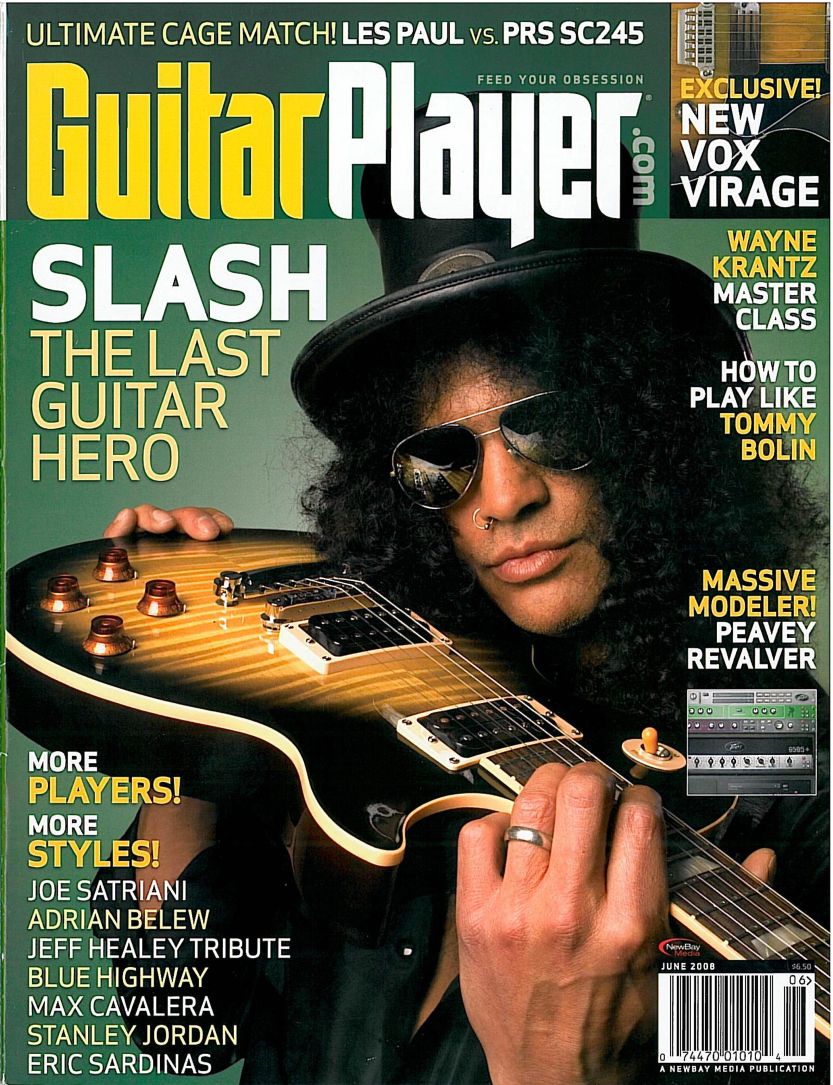
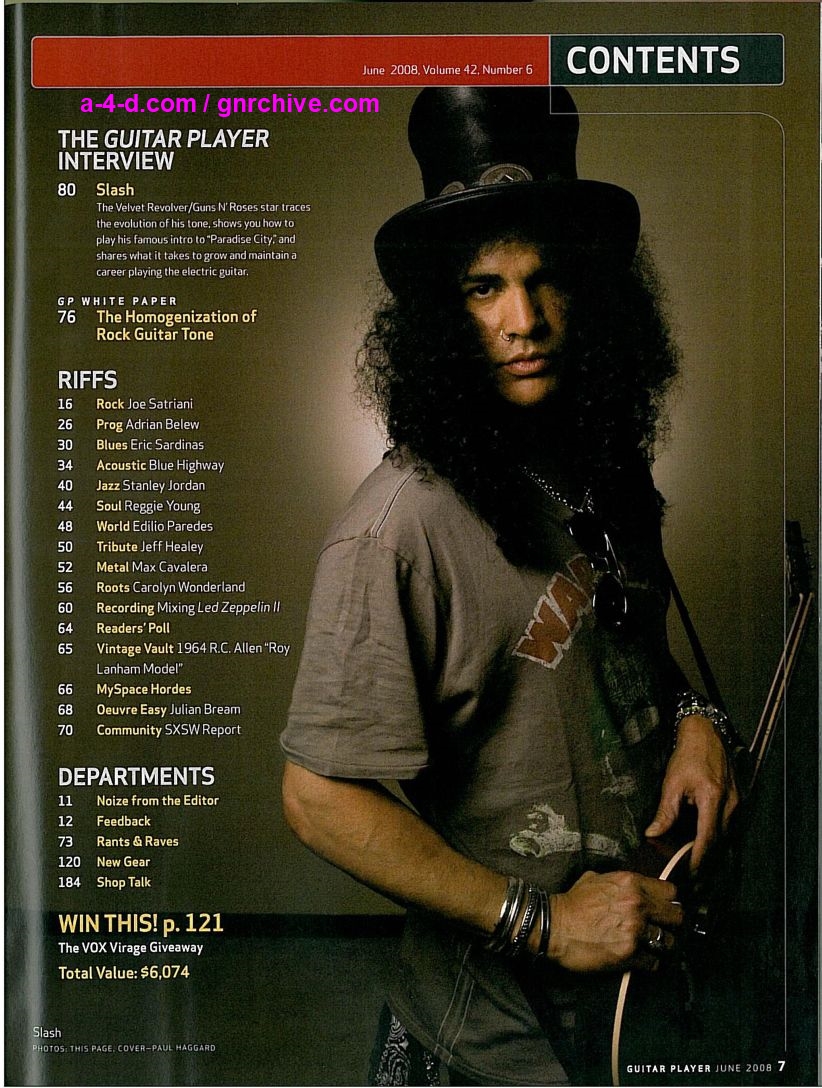
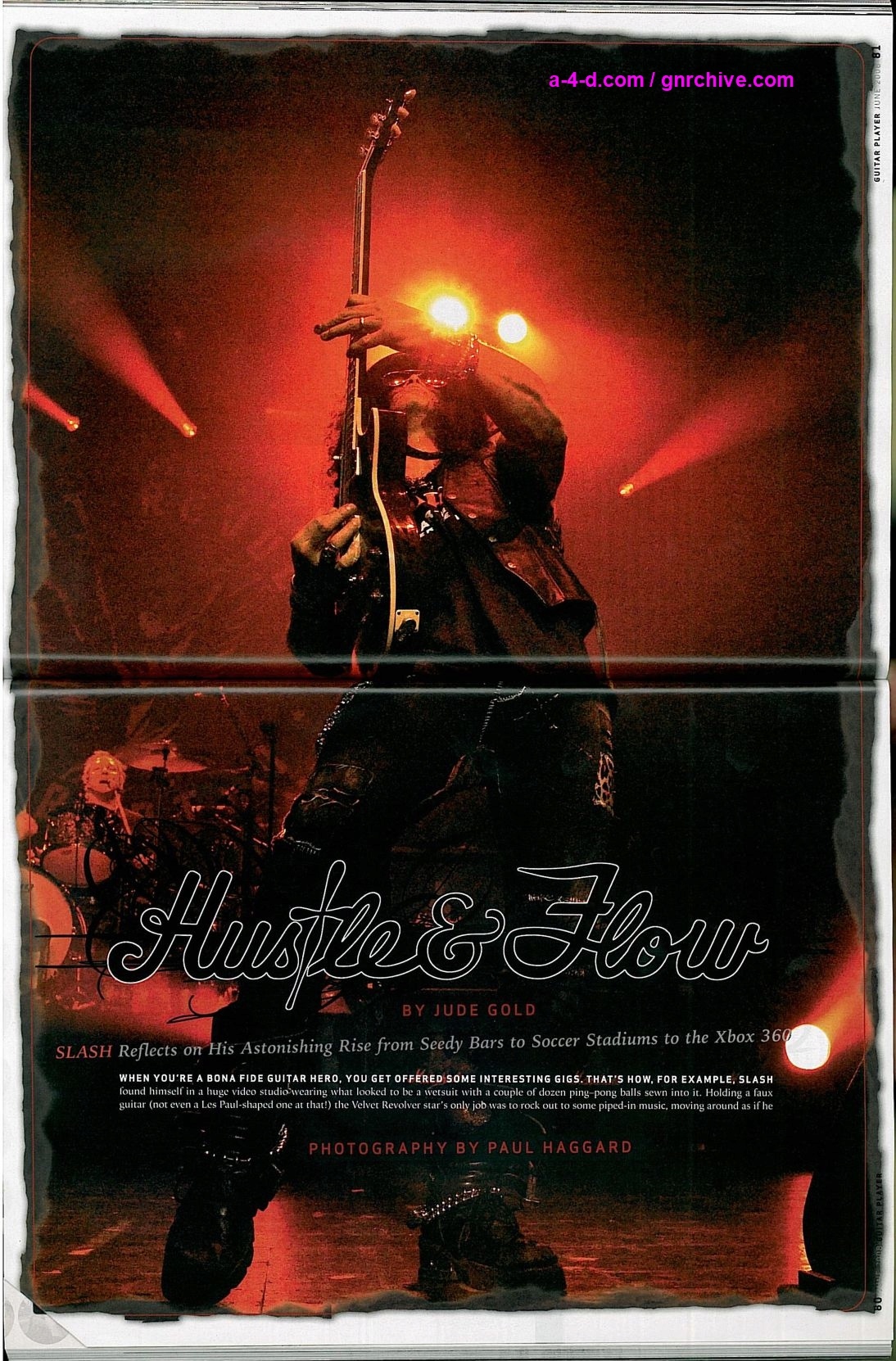
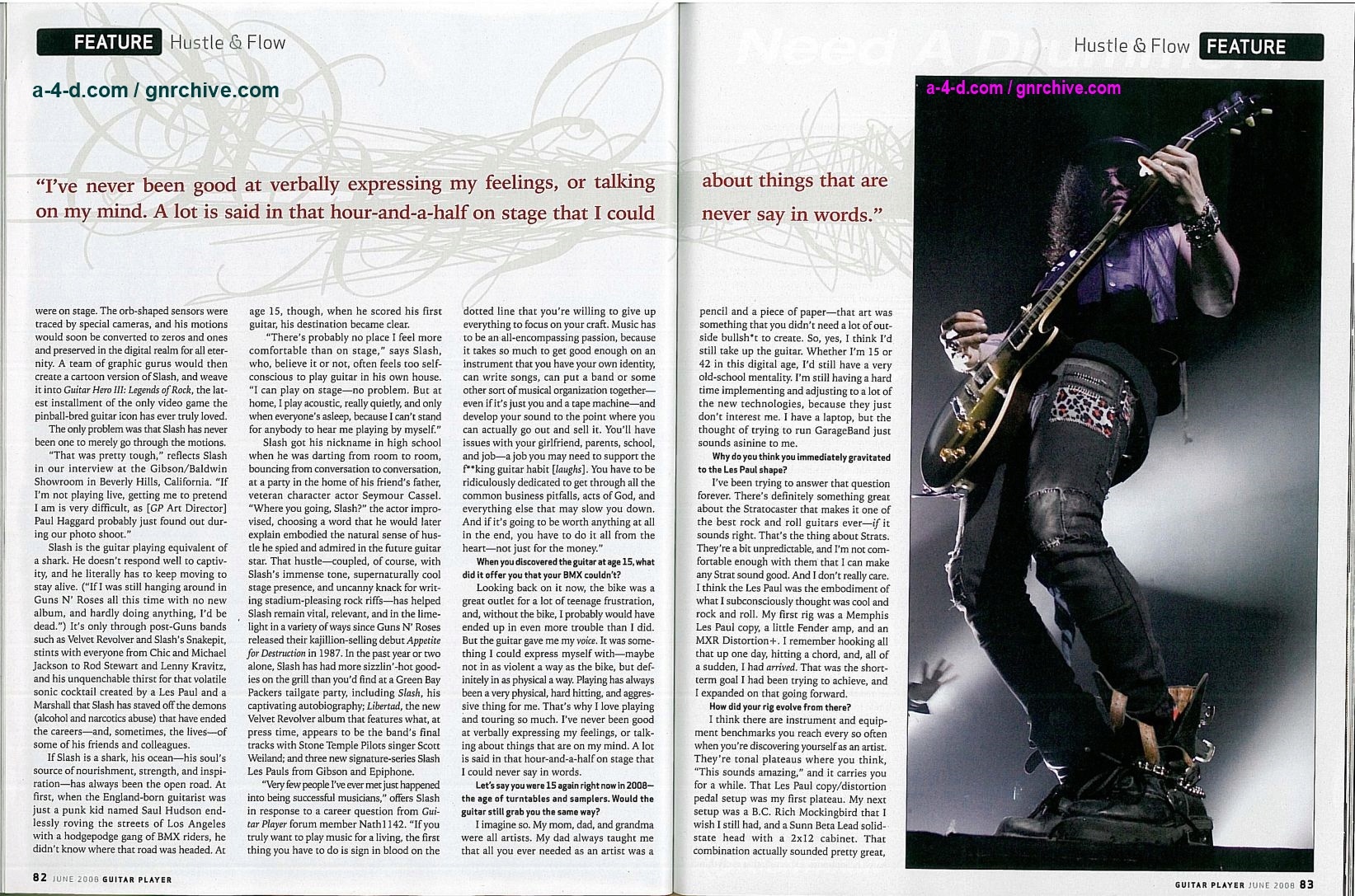
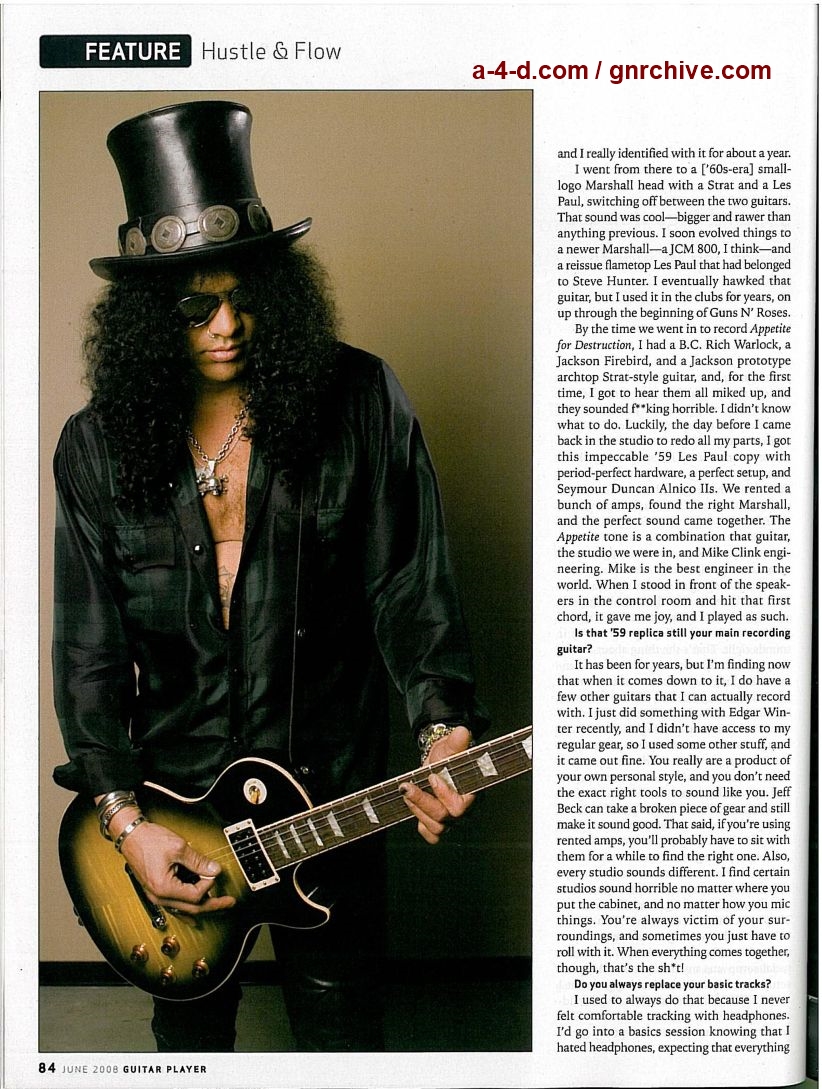
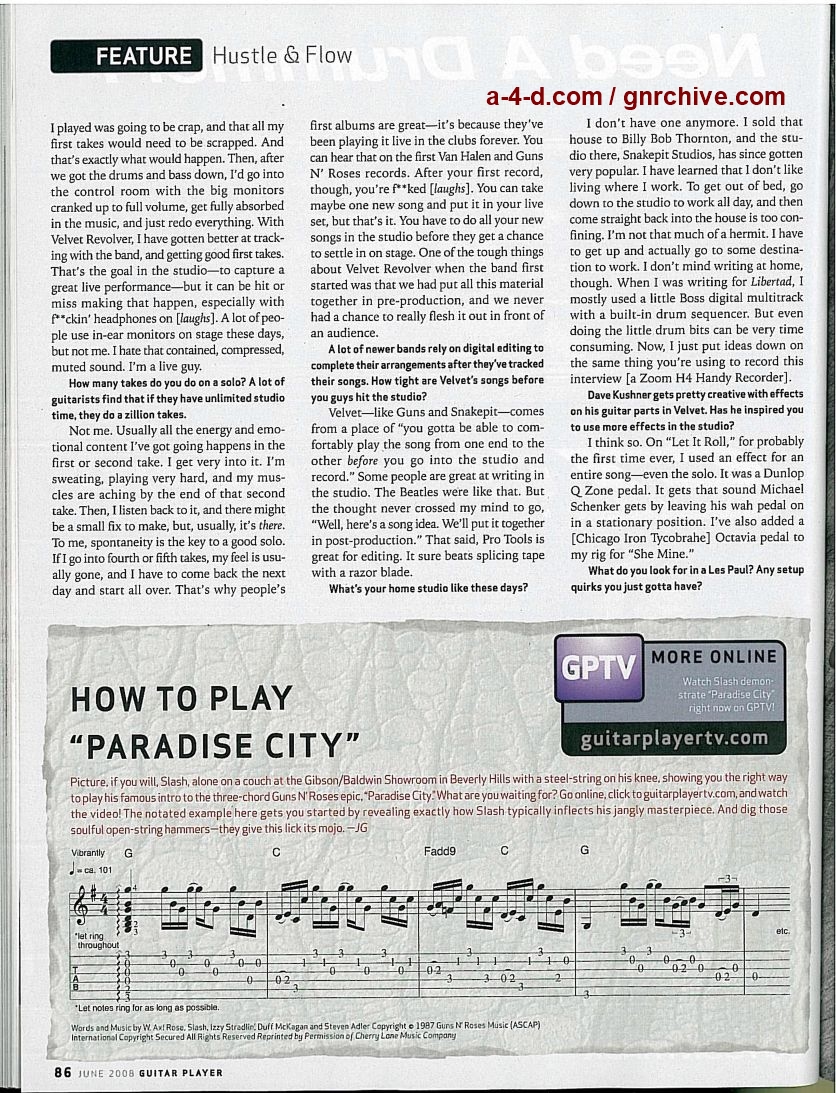
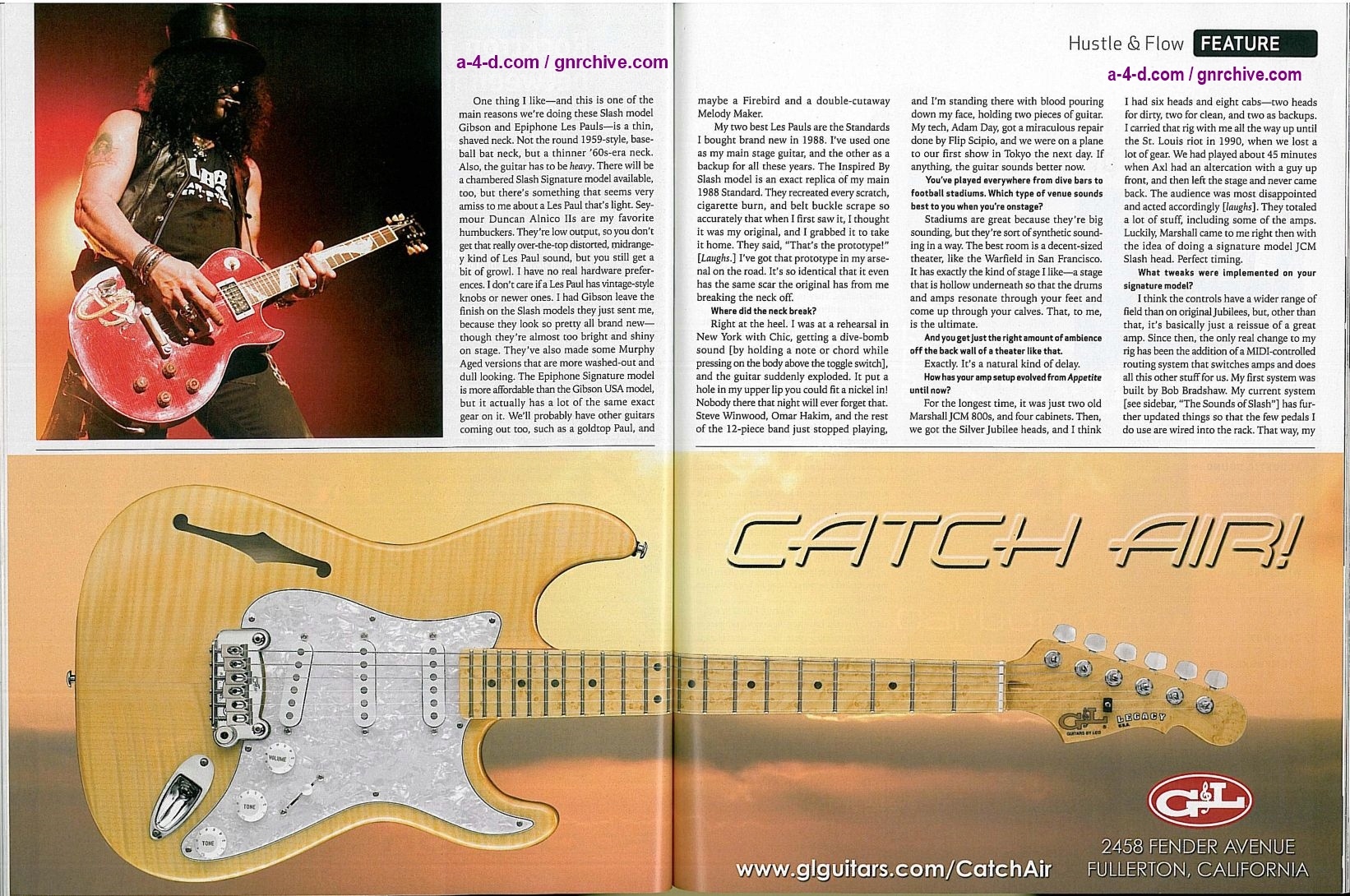
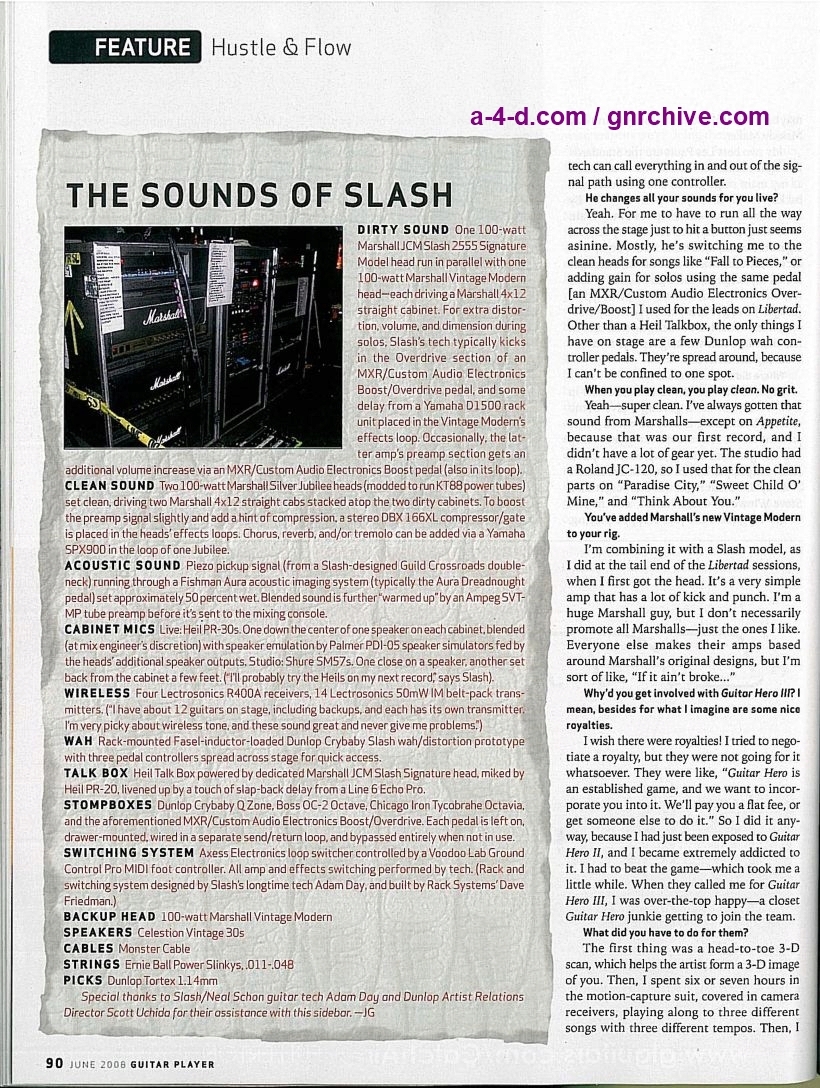
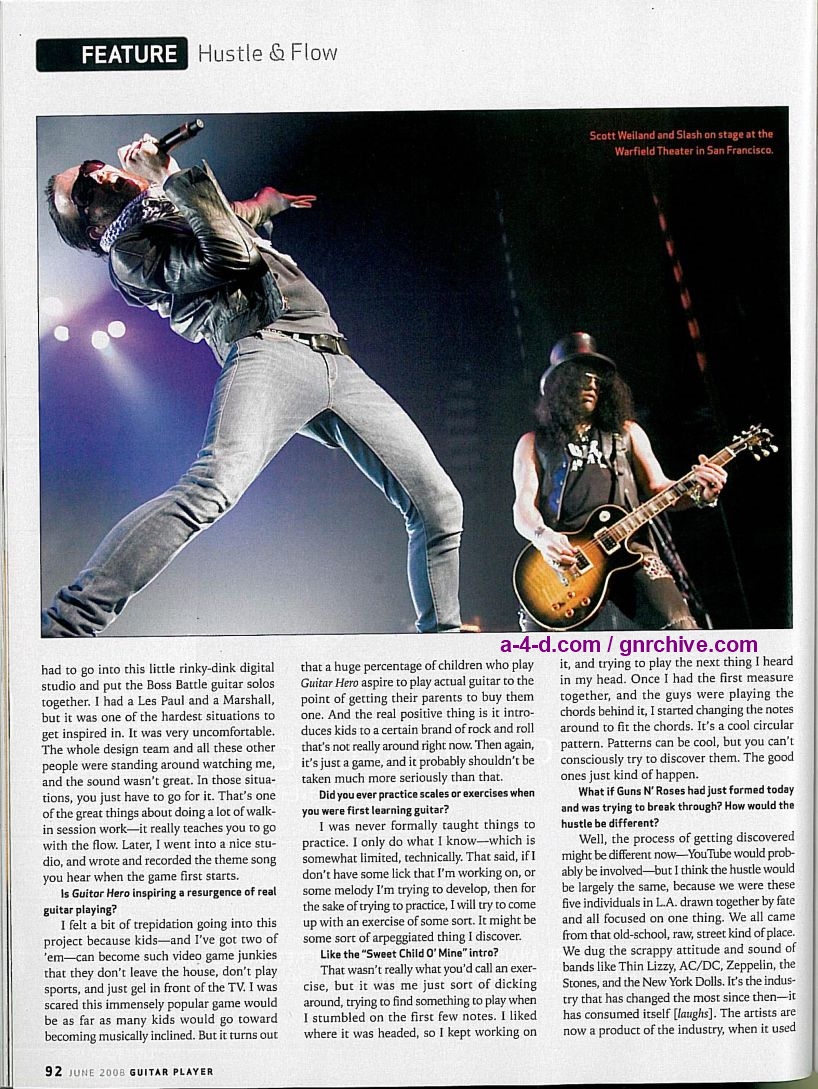
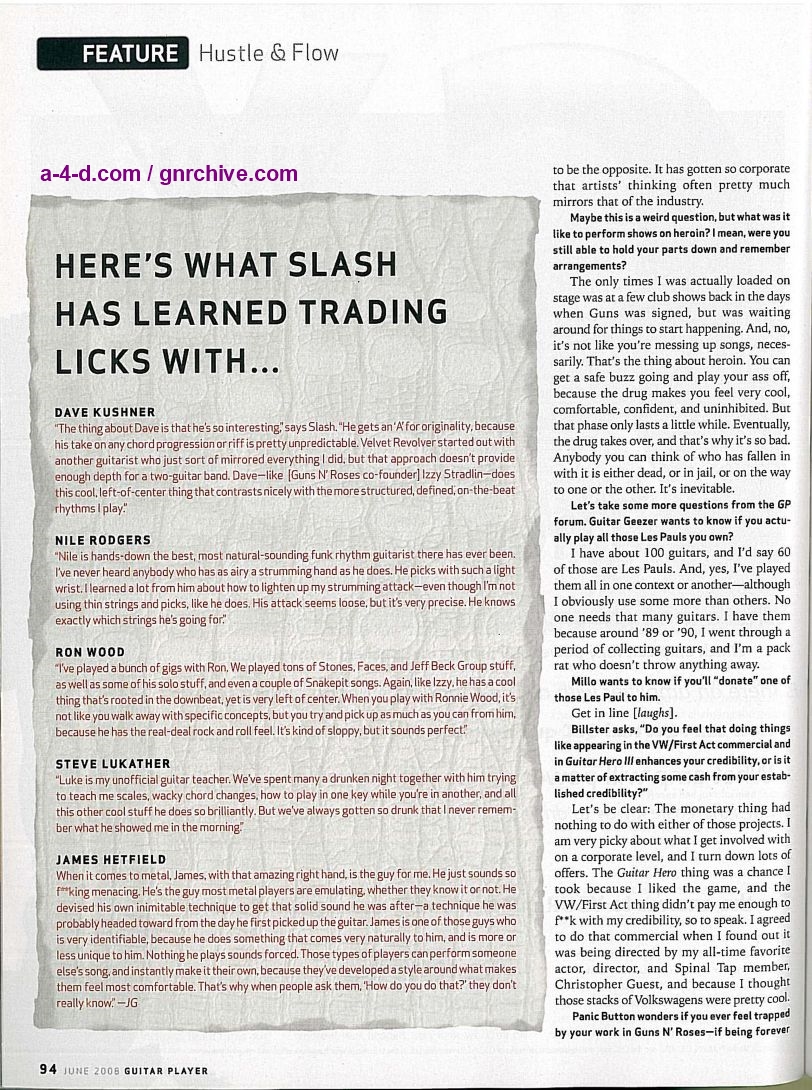
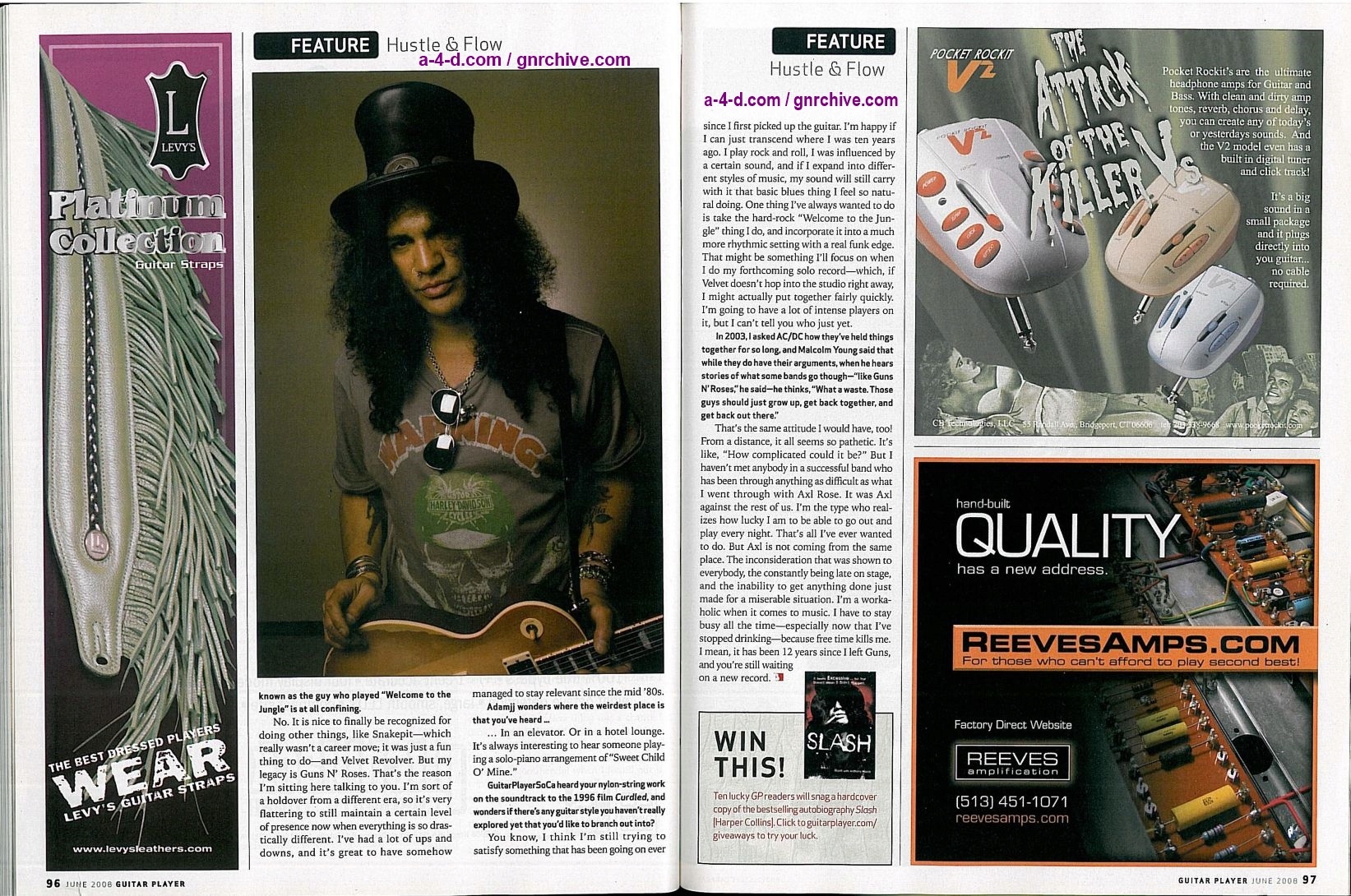
Hustle & Flow
Slash reflects on his astonishing ride from seedy bars to soccer stadiums to the Xbox 360
BY JUDE GOLD
PHOTOGRAPHY BY PAUL HAGGARD
When you’re a bona fide guitar hero, you get offered some interesting gigs. That’s how, for example, Slash found himself in a huge video studio wearing what looked to be a wetsuit with a couple of dozen ping-pong balls sewn into it. Holding a faux guitar (not even a Les Paul-shaped one at that!) the Velvet Revolver star’s only job was to rock out to some piped-in music, moving around as if he were on stage. The orb-shaped sensors were traced by special cameras, and his motions would soon be converted to zeros and ones and preserved in the digital realm for all eternity. A team of graphic gurus would then create a cartoon version of Slash, and weave it into Guitar Hero III: Legends of Rock, the latest installment of the only video game the pinball-bred guitar icon has ever truly loved. The only problem was that Slash has never been one to merely go through the motions. "That was pretty tough," reflects Slash in our interview at the Gibson/Baldwin Showroom in Beverly Hills, California. "If I'm not playing live, getting me to pretend I am is very difficult, as [GP Art Director] Paul Haggard probably just found out during our photo shoot."
Slash is the guitar playing equivalent of a shark. He doesn't respond well to captivity, and he literally has to keep moving to stay alive. ("If I was still hanging around in Guns N' Roses all this time with no new album, and hardly doing anything, I'd be dead.") It's only through post-Guns bands such as Velvet Revolver and Slash's Snakepit, stints with everyone from Chic and Michael Jackson to Rod Stewart and Lenny Kravitz, and his unquenchable thirst for that volatile sonic cocktail created by a Les Paul and a Marshall that Slash has staved off the demons (alcohol and narcotics abuse) that have ended the careers - and, sometimes, the lives - of some of his friends and colleagues.
If Slash is a shark, his ocean - his soul's source of nourishment, strength, and inspiration – has always been the open road. At first, when the England-born guitarist was just a punk kid named Saul Hudson endlessly roving the streets of Los Angeles with a hodgepodge gang ofBMX riders, he didn't know where that road was headed. At age 15, though, when he scored his first guitar, his destination became clear.
"There's probably no place I feel more comfortable than on stage," says Slash, who, believe it or not, often feels coo self conscious to play guitar in his own house. "I can play on stage - no problem. But at home, I play acoustic, really quietly, and only when everyone's asleep, because I can't stand for anybody to hear me playing by myself."
Slash got his nickname in high school when he was darting from room co room, bouncing from conversation co conversation, at a party in the home of his friend's father, veteran character actor Seymour Cassel. "Where you going, Slash?" the actor improvised, choosing a word chat he would lacer explain embodied the natural sense of hustle he spied and admired in the future guitar star. That hustle - coupled, of course, with Slash's immense tone, supernaturally cool stage presence, and uncanny knack for writing stadium-pleasing rock riffs - has helped Slash remain vital, relevant, and in the limelight in a variety of ways since Guns N' Roses released their kajillion-selling debut Appetite for Destruction in 1987. In the past year or two alone, Slash has had more sizzlin'-hot goodies on the grill than you'd find at a Green Bay Packers tailgate party, including Slash, his captivating autobiography; Libertad, the new Velvet Revolver album that features what, at press time, appears to be the band's final cracks with Stone Temple Pilots singer Scott Weiland; and three new signature-series Slash Les Pauls from Gibson and Epiphone.
"Very few people I've ever met just happened into being successful musicians," offers Slash in response to a career question from Gutar Player forum member Nath1142. "If you truly want to play music for a living, the first thing you have to do is sign in blood on the dotted line chat you're willing to give up everything to focus on your craft. Music has to be an all-encompassing passion, because it takes so much to get good enough on an instrument that you have your own identity, can write songs, can put a band or some other sort of musical organization together even if it's just you and a tape machine - and develop your sound to the point where you can actually go out and sell it. You'll have issues with your girlfriend, parents, school, and job - a job you may need to support the fucking guitar habit [laughs]. You have to be ridiculously dedicated to go through all the common business pitfalls, acts of God, and everything else that may slow you down. And if it's going to be worth anything at all in the end, you have to do it all from the heart - not just for the money."
When you discovered theguitar at age 15, what did it offer you that your BMX couldn't?
Looking back on it now, the bike was a great outlet for a lot of teenage frustration, and, without the bike, I probably would have ended up in even more trouble than I did. But the guitar gave me my voice. It was something I could express myself with-maybe not in as violent a way as the bike, but definitely in as physical a way. Playing has always been a very physical, hard hitting, and aggressive thing for me. That's why I love playing and touring so much. I've never been good at verbally expressing my feelings, or talking about things that are on my mind. A lot is said in that hour-and-a-half on stage that I could never say in words.
Let's say you were 15 again right now in 2008 - the age of turntables and samplers. Would the guitar still grab you the same way?
I imagine so. My morn, dad, and grandma were all artists. My dad always taught me that all you ever needed as an artist was a pencil and a piece of paper - that art was something that you didn't need a lot of outside bullshit to create. So, yes, I think I'd still take up the guitar. Whether I'm 15 o 42 in this digital age, I'd still have a very old-school mentality. I'm still having a hard time implementing and adjusting to a lot of the new technologies, because they just don't interest me. I have a laptop, but the thought of trying to run GarageBand just sounds asinine to me.
Why do you think you immediately gravitated to the Les Paul shape?
I've been trying to answer that question forever. There's definitely something great about the Stratocaster that makes it one of the best rock and roll guitars ever - if it sounds right. That's the thing about Strats. They're a bit unpredictable, and I'm not comfortable enough with them that I can make any Strat sound good. And I don't really care. I think the Les Paul was the embodiment of what I subconsciously thought was cool and rock and roll. My first rig was a Memphis Les Paul copy, a little Fender amp, and an MXR Distortion+. I remember hooking all that up one day, hitting a chord, and, all of a sudden, I had arrived. That was the shortterm goal I had been trying to achieve, and I expanded on that going forward.
How did your rig evolve from there?
I think there are instrument and equipment benchmarks you reach every so often when you're discovering yourself as an artist. They're tonal plateaus where you think, "This sounds amazing," and it carries you for a while. That Les Paul copy/distortion pedal setup was my first plateau. My next setup was a B.C. Rich Mockingbird that I wish I still had, and a Sunn Beta Lead solidstate head with a 2x12 cabinet. That combination actually sounded pretty great, and I really identified with it for about a year.
I went from there to a ['60s-era] smalllogo Marshall head with a Strat and a Les Paul, switching off between the two guitars. That sound was cool - bigger and rawer than anything previous. I soon evolved things to a newer Marshall - a JCM 800, I think-and a reissue flametop Les Paul that had belonged to Steve Hunter. I eventually hawked that guitar, but I used it in the clubs for years, on up through the beginning of Guns N' Roses.
By the time we went in to record Appetite for Destruction, I had a B.C. Rich Warlock, a Jackson Firebird, and a Jackson prototype archtop Strat-style guitar, and, for the first time, I got to hear them all miked up, and they sounded fucking horrible. I didn't know what to do. Luckily, the day before I came back in the studio to redo all my parts, I got this impeccable '59 Les Paul copy with period-perfect hardware, a perfect setup, and Seymour Duncan Alnico IIs. We rented a bunch of amps, found the right Marshall, and the perfect sound came together. The Appetite tone is a combination that guitar, the studio we were in, and Mike Clink engineering. Mike is the best engineer in the world. When I stood in front of the speakers in the control room and hit that first chord, it gave me joy, and I played as such.
Is that '59 replica still your main recording guitar?
It has been for years, but I'm finding now that when it comes down to it, I do have a few other guitars that I can actually record with. I just did something with Edgar Winter recently, and I didn't have access to my regular gear, so I used some other stuff, and it came out fine. You really are a product of your own personal style, and you don't need the exact right tools to sound like you. Jeff Beck can take a broken piece of gear and still make it sound good. That said, if you're using rented amps, you'll probably have to sit with them for a while to find the right one. Also, every studio sounds different. I find certain studios sound horrible no matter where you put the cabinet, and no matter how you mic things. You're always victim of your surroundings, and sometimes you just have to roll with it. When everything comes together, though, that's the shit!
Do youalways replace your basic tracks?
I used to always do that because I never felt comfortable tracking with headphones. I'd go into a basics session knowing that I hated headphones, expecting that everything I played was going to be crap, and that all my first takes would need to be scrapped. And that's exactly what would happen. Then, after we got the drums and bass down, I'd go into the control room with the big monitors cranked up to full volume, get fully absorbed in the music, and just redo everything. With Velvet Revolver, I have gotten better at tracking with the band, and getting good first takes. That's the goal in the studio - to capture a great live performance - but it can be hit or miss making that happen, especially with f.. ckin' headphones on [laughs]. A lot of people use in-ear monitors on stage these days, but not me. I hate that contained, compressed, muted sound. I'm a live guy.
How many takes do you do on a solo? A lot of guitarists find that if they have unlimited studio time, they do a zillion takes.
Not me. Usually all the energy and emotional content I've got going happens in the first or second take. I get very into it. I'm sweating, playing very hard, and my muscles are aching by the end of that second take. Then, I listen back to it, and there might be a small fix to make, but, usually, it's there. To me, spontaneity is the key to a good solo. If I go into fourth or fifth takes, my feel is usually gone, and I have to come back the next day and start all over. That's why people's first albums are great - it's because they've been playing it live in the clubs forever. You can hear that on the first Van Halen and Guns N' Roses records. After your first record, though, you're f"*ked [laughs]. You can take maybe one new song and put it in your live set, but that's it. You have to do all your new songs in the studio before they get a chance to settle in on stage. One of the tough things about Velvet Revolver when the band first started was that we had put all this material together in pre-production, and we never had a chance to really flesh it out in front of an audience.
A lot of newer bands rely on digital editing to complete their arrangements after they've tracked their songs. How tight are Velvet's songs before you guys hit the studio?
Velvet - like Guns and Snakepit – comes from a place of "you gotta be able to comfortably play the song from one end to the other before you go into the studio and record." Some people are great at writing in the studio. The Beatles were like that. But the thought never crossed my mind to go, "Well, here's a song idea. We'll put it together in post-production." That said, Pro Tools is great for editing. It sure beats splicing tape with a razor blade.
What's your home studio like these days?
I don't have one anymore. I sold that house to Billy Bob Thornton, and the studio there, Snakepit Studios, has since gotten very popular. I have learned that I don't like living where I work. To get out of bed, go down to the studio to work all day, and then come straight back into the house is too confining. I'm not that much of a hermit. I have to get up and actually go to some destination to work. I don't mind writing at home, though. When I was writing for Libertad, I mostly used a little Boss digital multicrack with a built-in drum sequencer. Bue even doing the little drum bits can be very time consuming. Now, I just put ideas down on the same thing you're using to record this interview [a Zoom H4 Handy Recorder].
Dave Kushner gets pretty creative with effects on his guitar parts in Velvet. Has he inspired you to use more effects in the studio?
I think so. On "Let It Roll," for probably the first time ever, I used an effect for an entire song - even the solo. It was a Dunlop Q Zone pedal. It gets that sound Michael Schenker gets by leaving his wah pedal on in a stationary position. I've also added a [Chicago Iron Tycobrahe] Octavia pedal to my rig for "She Mine."
What do you look for in a Les Paul? Any setup quirks you just gotta have?
One thing I like - and this is one of the main reasons we're doing these Slash model Gibson and Epiphone Les Pauls - is a thin, shaved neck. Not the round 1959-style, baseball bat neck, but a thinner '60s-era neck. Also, the guitar has to be heavy. There will be a chambered Slash Signature model available, too, but there's something that seems very amiss to me about a Les Paul that's light. Sey mour Duncan Alnico Ils are my favorite humbuckers. They're low output, so you don't get that reallyover-the-top distorted, midrangey kind of Les Paul sound, but you still get a bit of growl. I have no real hardware preferences. I don't care if a Les Paul has vintage-style knobs or newer ones. I had Gibson leave the finish on the Slash models they just sent me, because they look so pretty all brand new though they're almost coo bright and shiny on stage. They've also made some Murphy Aged versions chat are more washed-out and dull looking. The Epiphone Signature model is more affordable than the Gibson USA model, but it actually has a lot of the same exact gear on it. We'll probably have other guitars coming out too, such as a goldtop Paul, and maybe a Firebird and a double-cutaway Melody Maker.
My two best Les Pauls are the Standards I bought brand new in 1988. I've used one as my main stage guitar, and the other as a backup for all these years. The Inspired By Slash model is an exact replica of my main 1988 Standard. They recreated every scratch, cigarette burn, and belt buckle scrape so accurately that when I first saw it, I thought it was my original, and I grabbed it to take it home. They said, "That's the prototype!" [Laughs.] I've got that prototype in my arsenal on the road. It's so identical that it even has the same scar the original has from me breaking the neck off.
Where did the neck break?
Right at the heel. I was at a rehearsal in New York with Chic, getting a dive-bomb sound [by holding a note or chord while pressing on the body above the toggle switch], and the guitar suddenly exploded. It put a hole in my upper lip you could fit a nickel in! Nobody there that night will ever forget that. Steve Winwood, Omar Hakim, and the rest of the 12-piece band just stopped playing, and I'm standing there with blood pouring down my face, holding two pieces of guitar. My tech, Adam Day, got a miraculous repair done by Flip Scipio, and we were on a plane to our first show in Tokyo the next day. If anything, the guitar sounds better now.
You've played everywhere from dive bars to football stadiums. Which type of venue sounds best to you when you're onstage?
Stadiums are great because they're big sounding, but they're sort of synthetic sounding in a way. The best room is a decent-sized theater, like the Warfield in San Francisco. It has exactly the kind of stage I like - a stage that is hollow underneath so that the drums and amps resonate through your feet and come up through your calves. That, to me, is the ultimate.
And you get just the right amount of ambience off the back wall of a theater like that.
Exactly. It's a natural kind of delay.
How has your amp setup evolved from Appetite until now?
For the longest time, it was just two old MarshallJCM 800s, and four cabinets. Then, we got the Silver Jubilee heads, and I think I had six heads and eight cabs - two heads for dirty, two for clean, and two as backups. I carried that rig with me all the way up until the St. Louis riot in 1990, when we lost a lot of gear. We had played about 45 minutes when Axl had an altercation with a guy up front, and then left the stage and never came back. The audience was most disappointed and acted accordingly [laughs]. They totaled a lot of stuff, including some of the amps. Luckily, Marshall came to me right then with the idea of doing a signature model JCM Slash head. Perfect timing.
What tweaks were implemented on your signature model?
I think the controls have a wider range of field than on original Jubilees, but, other than that, it's basically just a reissue of a great amp. Since then, the only real change to my rig has been the addition of a MlDI-controlled routing system that switches amps and does all this other stuff for us. My first system was built by Bob Bradshaw. My current system [see sidebar, "The Sounds of Slash"] has further updated things so that the few pedals I do use are wired into the rack. That way, my tech can call everything in and out of the signal path using one controller.
He changes all your sounds for you live?
Yeah. For me to have to run all the way across the stage just to hit a button just seems asinine. Mostly, he's switching me to the clean heads for songs like "Fall to Pieces," or adding gain for solos using the same pedal [an MXR/Custom Audio Electronics Over drive/Boost] I used for the leads on Libertad. Other than a Heil Talkbox, the only things I have on stage are a few Dunlop wah controller pedals. They're spread around, because I can't be confined to one spot.
When you play clean, you play clean. No grit.
Yeah - superclean. I've always gotten that sound from Marshalls - except on Appetite, because that was our first record, and I didn't have a lot of gear yet. The studio had a RolandJC-120, so I used that for the clean parts on "Paradise City," "Sweet Child O' Mine," and "Think About You."
You've added Marshall's new Vintage Modern to your rig.
I'm combining it with a Slash model, as I did at the tail end of the Libertad sessions, when I first got the head. It's a very simple amp that has a lot of kick and punch. I'm a huge Marshall guy, but I don't necessarily promote all Marshalls - just the ones I like. Everyone else makes their amps based around Marshall's original designs, but I'm sort of like, "If it ain't broke..."
Why'd you get involved with Guitar Hero III? I mean, besides for what I imagine are some nice royalties.
I wish there were royalties! I tried to negotiate a royalty, but they were not going for it whatsoever. They were like, "Guitar Hero is an established game, and we want to incorporate you into it. We'll pay you a flat fee, or get someone else to do it." So I did it anyway, because I had just been exposed to Guitar Hero II, and I became extremely addicted to it. I had to bear the game - which took me a little while. When they called me for Guitar Hero III, I was over-the-top happy - a closet Guitar Hero junkie getting to join the team.
What did you have to do for them?
The first thing was a head-to-toe 3-D scan, which helps the artist form a 3-D image of you. Then, I spent six or seven hours in the motion-capture suit, covered in camera receivers, playing along to three different songs with three different tempos. Then, I had to go into this little rinky-dink digital studio and put the Boss Battle guitar solos together. I had a Les Paul and a Marshall, but it was one of the hardest situations to get inspired in. It was very uncomfortable. The whole design team and all these other people were standing around watching me, and the sound wasn't great. In those situations, you just have to go for it. That's one of the great things about doing a lot of walkin session work - it really teaches you to go with the flow. Later, I went into a nice studio, and wrote and recorded the theme song you hear when the game first starts.
Is Guitar Hero inspiring a resurgence of real guitar playing?
I felt a bit of trepidation going into this project because kids - and I've got two of 'em - can become such video game junkies that they don't leave the house, don't play sports, and just gel in front of the TV. I was scared this immensely popular game would be as far as many kids would go toward becoming musically inclined. But it turns out that a huge percentage of children who play Guitar Hero aspire to play actual guitar to the point of getting their parents to buy them one. And the real positive thing is it introduces kids to a certain brand of rock and roll that's not really around right now. Then again, it's just a game, and it probably shouldn't be taken much more seriously than that.
Did you ever practice scales or exercises when you were first learning guitar?
I was never formally taught things to practice. I only do what I know - which is somewhat limited, technically.That said, if I don't have some lick that I'm working on, or some melody I'm trying to develop, then for the sake of trying to practice, I will try to come up with an exercise of some sort. It might be some sort of arpeggiated thing I discover.
Like the "Sweet Child O' Mine" intro?
That wasn't really what you'd call an exercise, but it was me just sort of dicking around, trying to find something to play when I stumbled on the first few notes. I liked where it was headed, so I kept working on it, and trying to play the next thing I heard in my head. Once I had the first measure together, and the guys were playing the chords behind it, I started changing the notes around to fit the chords. It's a cool circular pattern. Patterns can be cool, but you can't consciously try to discover them. The good ones just kind of happen.
What if Guns N'Roses had just formed today and was trying to break through? How would the hustle be different?
Well, the process of getting discovered might be different now - YouTube would probably be involved - but I think the hustle would be largely the same, because we were these five individuals in L.A. drawn together by fate and all focused on one thing. We all came from that old-school, raw, srreet kind of place. We dug the scrappy attitude and sound of bands like Thin Lizzy, AC/DC, Zeppelin, the Stones, and the New York Dolls. It's the industry that has changed the most since then - it has consumed itself [laughs]. The artists are now a product of the industry, when it used to be the opposite. It has gotten so corporate that artists' thinking often pretty much mirrors that of the industry.
Maybe this is a weird question, but what was it like to perform shows on heroin? I mean, were you still able to hold your parts down and remember arrangements?
The only times I was actually loaded on stage was at a few club shows back in the days when Guns was signed, but was waiting around for things to start happening. And, no, it's not like you're messing up songs, necessarily. That's the thing about heroin. You can get a safe buzz going and play your ass off, because the drug makes you feel very cool, comfortable, confident, and uninhibited. But that phase only lasts a little while. Eventually, the drug takes over, and that's why it's so bad. Anybody you can think of who has fallen in with it is either dead, or in jail, or on the way to one or the other. It's inevitable.
Let's take some more questions from the GP forum. Guitar Geezer wants to know if you actually play all those Les Pauls you own?
I have about 100 guitars, and I'd say 60 of those are Les Pauls. And, yes, I've played them all in one context or another - although I obviously use some more than others. No one needs that many guitars. I have them because around '89 or '90, I went through a period of collecting guitars, and I'm a pack rat who doesn't throw anything away.
Millo wants to know if you'll "donate" one of those Les Paul to him.
Get in line [laughs].
Billster asks, "Do you feel that doing things like appearing in the VW/First Act commercial and in Guitar Hero III enhances your credibility, or is it a matter of extracting some cash from your established credibility?"
Let's be clear: The monetary thing had nothing to do with either of those projects. I am very picky about what I get involved with on a corporate level, and I turn down lots of offers. The Guitar Hero thing was a chance I took because I liked the game, and the VW/First Act thing didn't pay me enough to f"*k with my credibility, so to speak. I agreed to do that commercial when I found out it was being directed by my all-time favorite actor, director, and Spinal Tap member, Christopher Guest, and because I thought those stacks of Volkswagens were pretty cool.
Panic Button wonders if you ever feel trapped by your work in Guns N' Roses - if being forever known as the guy who played "Welcome to the Jungle" is at all confining.
No. It is nice to finally be recognized for doing other things, like Snakepit - which really wasn't a career move; it was just a fun thing to do - and Velvet Revolver. But my legacy is Guns N' Roses. That's the reason I'm sitting here talking to you. I'm sort of a holdover from a different era, so it's very flattering to still maintain a certain level of presence now when everything is so drastically different. I've had a lot of ups and downs, and it's great to have somehow managed to stay relevant since the mid '80s.
Adamjj wonders where the weirdest place is that you've heard...
.. . In an elevator. Or in a hotel lounge. It's always interesting to hear someone playing a solo-piano arrangement of "Sweet Child O' Mine."
GuitarPlayerSoCa heard your nylon-string work on the soundtrack to the 1996 film Curdled, and wonders if there's any guitar style you haven't really explored yet that you'd like to branch out into?
You know, I think I'm still trying to satisfy something that has been going on ever since I first picked up the guitar. I'm happy if I can just transcend where I was ten years ago. I play rock and roll, I was influenced by a certain sound, and if I expand into different styles of music, my sound will still carry with in that basic blues thing I feel so natural doing. One thing I've always wanted to do is take the hard-rock "Welcome to the Jungle" thing I do, and incorporate it into a much more rhythmic setting with a real funk edge. That might be something I'll focus on when I do my forthcoming solo record - which, if Velvet doesn't hop into the studio right away, I might actually put together fairly quickly. I'm going to have a lot of intense players on it, but I can't tell you who just yet.
In 2003, I asked AC/DC how they've held things together for so long, and Malcolm Young said that while they do have their arguments, when he hears stories of what some bands go through-"like Guns N'Roses,” he said - he thinks,"What a waste. Those guys should just grow up, get back together, and get back out there.”
That's the same attitude I would have, too! From a distance, it all seems so pathetic. It's like, "How complicated could it be?" But I haven't met anybody in a successful band who has been through anything as difficult as what I went through with Axl Rose. It was Axl against the rest of us. I'm the type who realizes how lucky I am to be able to go out and play every night. That's all I've ever wanted to do. But Axl is not coming from the same place. The inconsideration that was shown to everybody, the constantly being late on stage, and the inability to get anything done just made for a miserable situation. I'm a workaholic when it comes to music. I have to stay busy all the time - especially now that I've stopped drinking – because free time kills me. I mean, it has been 12 years since I left Guns, and you're still waiting on a new record.
*
HERE’S WHAT SLASH HAS LEARNED TRADING LICKS WITH...
DAVE KUSHNER
''The thing about Dave is that he's so interesting,'' says Slash. "He gets an 'A' for originality, because his take on any chord progression or riff is pretty unpredictable. Velvet Revolver started out with another guitarist who just sort of mirrored everything I did, but that approach doesn't provide enough depth for a two-guitar band. Dave - like [Guns N' Roses co-founder]Izzy Stradlin - does this cool, left-of-center thing that contrasts nicely with the more structured, defined, on-the-beat rhythms I play'.'
NILE RODGERS
"Nile is hands-down the best, most natural-sounding funk rhythm guitarist there has ever been. I've never heard anybody who has as airy a strumming hand as he does. He picks with such a light wrist. I learned a lot from him about how to lighten up my strumming attack - even though I'm not using thin strings and picks, like he does. His attack seems loose, but it's very precise. He knows exactly which strings he's going for.''
RON WOOD
"I've played a bunch of gigs with Ron. We played tons of Stones, Faces, and Jeff Beck Group stuff, as well as some of his solo stuff, and even a couple of Snakepit songs. Again, like Izzy, he has ac ool thing that's rooted in the downbeat, yet is very left of center. When you play with Ronnie Wood, it's not like you walk away with specific concepts, but you try and pick up as much as you can from him, because he has the real-deal rock and roll feel. It's kind of sloppy, but i tsounds perfect.”
STEVE LUKATHER
"Luke is my unofficial guitar teacher. We've spent many a drunken night together with him trying to teach me scales, wacky chord changes, how to play in one key while you're in another, and all this other cool stuff he does so brilliantly. But we've always gotten so drunk that I never remember what hes howed me in the morning.''
JAMES HETFIELD
When it comes to metal,James, with that amazing right hand, is the guy for me.He just sounds so f""king menacing. He's the guy most metal players are emulating, whether they know it or not. He devised his own inimitable technique to get that solid sound he was after - a technique he was probably headed toward from the day he first picked up the guitar. James is one of those guys who is very identifiable, because he does something that comes very naturally to him, and is more or less unique to him. Nothing he plays sounds forced. Those types of players can perform someone else's song, and instantly make it their own, because they've developed a style around what makes them feel most comfortable. That's why when people ask them, 'How do you do that?' they don't really know'.''

Blackstar- ADMIN
- Posts : 13243
Plectra : 86439
Reputation : 97
Join date : 2018-03-17
 Similar topics
Similar topics» 2019.10.DD - Guitar Player - The Write Stuff (Slash)
» 2019.04.05 - Guitar.com - “I’m still a self-conscious and insecure guitar player!” (Slash)
» 2008.04.DD - Guitar Player Magazine - Tapping Into Genius (Bumblefoot)
» 2000.12.DD - Guitar Player - Slash & Burn (Slash)
» 2023.05.DD - Guitar Player - Slash: The Collection
» 2019.04.05 - Guitar.com - “I’m still a self-conscious and insecure guitar player!” (Slash)
» 2008.04.DD - Guitar Player Magazine - Tapping Into Genius (Bumblefoot)
» 2000.12.DD - Guitar Player - Slash & Burn (Slash)
» 2023.05.DD - Guitar Player - Slash: The Collection
Page 1 of 1
Permissions in this forum:
You cannot reply to topics in this forum|
|
|

